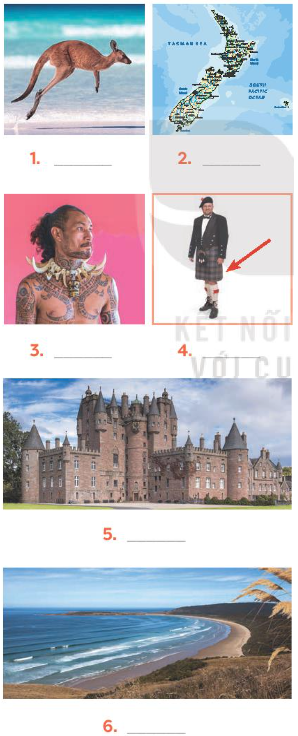Tiếng Anh 7 Unit 12 A Closer Look 11. Write the words or phrases under the correct pictures. 2. Use the words in the box to complete the sentences. 3. Work in pairs. Discuss and write the word or phrase in the box next to its explanation 4. Listen and repeat, paying attention to the intonation of the following questions. 5. Circle the correct intonation. Then listen and repeat. GÓP Ý HAY - NHẬN NGAY QUÀ CHẤT Gửi góp ý cho HocTot.Nam.Name.Vn và nhận về những phần quà hấp dẫn
Lựa chọn câu để xem lời giải nhanh hơn
Bài 1 Video hướng dẫn giải Vocabulary 1. Write the words or phrases under the correct pictures. (Viết các từ hoặc cụm từ dưới các hình ảnh đúng.)
Lời giải chi tiết: 1. kangaroo (chuột túi) 2. island country (quốc đảo) 3. tattoo (hình xăm) 4. Scottish kilt (váy năm Scottish) 5. castle (lâu đài) 6. coastline (đường bờ biển) Bài 2 Video hướng dẫn giải 2. Use the words in the box to complete the sentences. (Sử dụng các từ trong hộp để hoàn thành các câu.)
1. From the top of the mountain, we had a(n) __________view of the valley below. 2. Scotland is famous for its long history and _______castles. 3. The long fences around the sheep farms in Australia are __________. You can't find them anywhere else in the world. 4. When you visit a new place, talk to the ______people 5. Kangaroos are ________to Australia. It is their home. Phương pháp giải: native (adj): thuộc về bản địa amazing (adj): tuyệt vời unique (adj): độc đáo, duy nhất local (adj): thuộc về địa phương ancient (adj): cổ kính Lời giải chi tiết:
1. From the top of the mountain, we had a(n) amazing view of the valley below. (Từ trên đỉnh núi, chúng tôi đã có một tầm nhìn tuyệt vời xuống thung lũng bên dưới.) 2. Scotland is famous for its long history and ancient castles. (Scotland nổi tiếng với lịch sử lâu đời và những lâu đài cổ kính.) 3. The long fences around the sheep farms in Australia are unique. You can't find them anywhere else in the world. (Những hàng rào dài xung quanh các trang trại cừu ở Australia có một không hai. Bạn không thể tìm thấy chúng ở bất kỳ nơi nào khác trên thế giới.) 4. When you visit a new place, talk to the local people. (Khi bạn đến thăm một địa điểm mới, hãy nói chuyện với người dân địa phương.) 5. Kangaroos are native to Australia. It is their home. (Chuột túi có nguồn gốc từ Úc. Đó là nhà của họ.) Bài 3 Video hướng dẫn giải 3. Work in pairs. Discuss and write the word or phrase in the box next to its explanation. (Làm việc theo cặp. Thảo luận và viết từ hoặc cụm từ vào ô bên cạnh lời giải thích.)
Phương pháp giải: symbol (n): biểu tượng capital (n): thủ đô boat ride (n): du thuyền tower (n): tòa tháp Lời giải chi tiết: 1. a tall narrow building with a small top - tower
(một tòa nhà cao hẹp với đỉnh nhỏ - tháp) 2. an object representing a place - symbol (một đối tượng đại diện cho một địa điểm - biểu tượng) 3. the most important city of a country - capital (thành phố quan trọng nhất của một quốc gia - thủ đô) 4. a tour on a river - boat ride (một chuyến tham quan trên sông - du thuyền) Bài 4 Video hướng dẫn giải 4. Listen and repeat, paying attention to the intonation of the following questions. (Nghe và lặp lại, chú ý ngữ điệu của những câu hỏi sau.) 1. Can you speak English? ↗ (Bạn có thể nói tiếng Anh không?) 2. Is Australia an island? ↗ (Úc có phải là một hòn đảo không?) 3. Will you visit Washington next year? ↗ (Bạn sẽ đến thăm Washington vào năm tới chứ?) 4. What is the capital of Scotland? ↘ (Thủ đô của Scotland là gì?) 5. How big is Canada? ↘ (Canada rộng lớn như thế nào?) Bài 5 Video hướng dẫn giải 5. Circle the correct intonation. Then listen and repeat. (Khoanh tròn đúng ngữ điệu. Sau đó nghe và lặp lại.) 1. Where is Canada? ↘ (Canada ở đâu?) 2. Could you show me Singapore on this map? ↗ (Bạn có thể chỉ cho tôi Singapore trên bản đồ này được không?) 3. How many states are there in the USA? ↘ (Có bao nhiêu tiểu bang ở Hoa Kỳ?) 4. Is English an official language in Malaysia? ↗ (Tiếng Anh có phải là ngôn ngữ chính thức ở Malaysia không?) 5. Do you know much about New Zealand? ↗ (Bạn có biết nhiều về New Zealand không?)
>> Học trực tuyến lớp 7 trên Tuyensinh247.com. Đầy đủ khoá học các bộ sách: Kết nối tri thức với cuộc sống; Chân trời sáng tạo; Cánh diều. Cam kết giúp học sinh lớp 7 học tốt, hoàn trả học phí nếu học không hiệu quả. PH/HS tham khảo chi tiết khoá học tại: Link
|




















